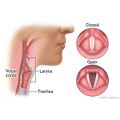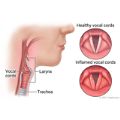Our Health Library information does not replace the advice of a doctor. Please be advised that this information is made available to assist our patients to learn more about their health. Our providers may not see and/or treat all topics found herein.
Topic Contents
Voice Problems
Condition Basics
What are voice problems?
Voice problems usually include pain or discomfort when you speak or difficulty controlling the pitch, loudness, hoarseness, or quality of your voice.
As you exhale, air gently passes through your throat, across your open vocal cords, and out your mouth and nose. When you speak, your vocal cords close partially as air travels through them, causing vibrations and the unique sound of your voice. Your voice is the result of remarkable and complex interactions involving several body parts—especially the lungs, voice box (larynx), and mouth. Damage to any of these body parts can lead to a voice problem.
What causes them?
Anyone can develop a voice problem, but your risk is greatest if your job puts a high demand on your vocal cords. For example, singers, preachers, and teachers have high-risk jobs. Aging also strains the vocal cords. If you scream or talk loudly, you increase your risk for voice problems. If you have ever had surgery on or near your vocal cords, are a smoker, or have had throat cancer, your risk for developing scar tissue and future voice problems increases as well.
What are the symptoms?
Typically, symptoms that mean you may have a voice problem include:
- A low, raspy, or rough voice.
- Hoarseness that continues for more than 2 or 3 weeks.
- Trouble swallowing or breathing.
- Coughing or choking when you swallow.
- Frequent throat clearing or the sensation that you have a lump in your throat.
How are they diagnosed?
Your doctor can usually diagnose a voice problem using information from a medical history and by doing a physical exam. Other tests may be done to evaluate vocal cord vibration or to detect suspicious areas in your throat. Additional testing doesn't necessarily mean you have a serious voice problem—it just helps your doctor pinpoint the cause of your voice problem.
How are voice problems treated?
For many voice problems, resting your vocal cords is all that is needed, although this can be difficult for some people. If you have a more serious or chronic voice problem, you may need medicines, surgery, voice therapy, or a combination of these. Treatment frequently succeeds in restoring the voice to normal. But it may take some time for your voice to return to normal, depending on the severity and cause of your voice problem.
How do you know if your voice problem is serious?
You might be one of those people who gets laryngitis every time you get the common cold. This is temporary and usually not serious. If your voice problem is accompanied by a cold and goes away within 2 to 3 weeks after your cold or flu is gone, it's probably nothing serious. If you feel concerned, you may want to see your doctor just to make sure.
But when unexplained changes in your voice continue for more than 2 or 3 weeks or interfere with your ability to communicate, you may have a more serious problem. For some people, the changes might get better but then reappear.
If you notice a change in your voice or if your voice problems get better but then come back, it's worth making an appointment with your doctor for further evaluation.
Related Information
Credits
Current as of: October 27, 2024
Author: Ignite Healthwise, LLC Staff
Clinical Review Board
All Healthwise education is reviewed by a team that includes physicians, nurses, advanced practitioners, registered dieticians, and other healthcare professionals.
Current as of: October 27, 2024
Author: Ignite Healthwise, LLC Staff
Clinical Review Board
All Healthwise education is reviewed by a team that includes physicians, nurses, advanced practitioners, registered dieticians, and other healthcare professionals.
This information does not replace the advice of a doctor. Ignite Healthwise, LLC disclaims any warranty or liability for your use of this information. Your use of this information means that you agree to the Terms of Use and Privacy Policy. Learn how we develop our content.
To learn more about Ignite Healthwise, LLC, visit webmdignite.com.
© 2024 Ignite Healthwise, LLC.





